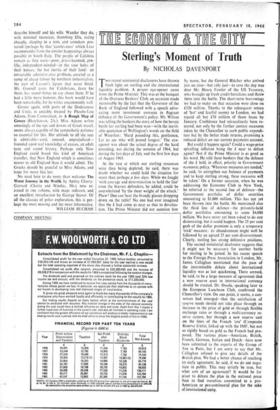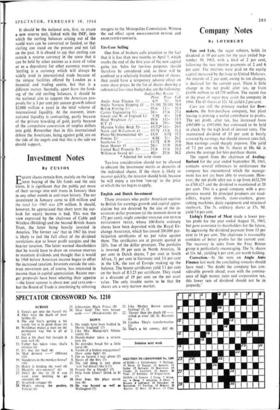11111E ECCAOHly A ME CO'nf
Sterling's Moment of Truth
By NICHOLAS DAVENPORT
wo recent ministerial disclosures have thrown I fresh light on sterling and the international liquidity problem. A proper eye-opener came from the Prime Minister. This was at the banquet of the Overseas Bankers' Club, an occasion made memorable by the fact that the Governor of the Bank of England followed with a speech advo- cating more investment overseas in flagrant defiance of the Government's policy. Mr. Wilson was telling the bankers the story of how the heroic battle for sterling had been won-with the inevit- able quotation of Wellington's words on the field of Waterloo: 'Hard pounding this, gentlemen. Let us see who will pound longest.' The eye- opener was about the actual degree of the hard pounding, not during the autumn of 1964, but during the last days of July and the first few days of August 1965.
At the rate at which our sterling' resources were then being depleted, he said, there was doubt whether we could hold the situation for more than perhaps a few days. While we fought 'with courage and determination to hold the line' even the bravest defenders, he added, could be overwhelmed 'by the sheer weight of the attack.' Phew! One can hear the brandy glasses dropping down on the table! No one had ever imagined that the £ had come as near as that to devalua- tion. The Prime Minister did not mention him by name, but the General Bliicher who arrived just on time-but only just-to save the day was dear Mr. Henry Fowler of the US Treasury, who brought up fresh credit-battalions and threw them into the battle. The short-term borrowings we had to make on that occasion were close on £320 million. Thanks to the• subsequent return of 'hot' and fearful money to London, we had repaid all but £70 million of those loans by January. Confidence had miraculously been re- stored, not only by the further austere measures taken by the Chancellor to curb public expendi- ture but by the better trade returns, promising a reduced deficit on our current payments account.
But could it happen again? Could a wage-price spiralling inflation bring the £ near to defeat again? Not if the Prime Minister is as good as his word. He told these bankers that the defence of the £ held, in effect, priority in Government economic policy. 'Whatever measures are needed,' he said, 'to strengthen our balance of payments and to keep sterling strong, these measures will be taken.' On a former occasion, when he was addressing the Economy Club in New York, he referred to the second line of defence-the. Government portfolio of dollar securities. amounting to $1,000 million. This has not yet been thrown into the battle. He mentioned also the third line of defence-the privately-held dollar portfolios amounting to some $4,000 million. We have never yet been asked to do any disinvesting, but it could happen. The 25 per cent grab of the dollar premium is only a temporary `trick' measure: its abandonment might well be followed by an agreed 25 per cent disinvestment. Clearly, sterling has strong defensive positions.
-The second ministerial disclosure suggests that it might not be necessary for another battle for sterling to be joined. In his recent speech to the Foreign Press Association in London, Mr.. James Callaghan mentioned that the pace of the interminable debate about international liquidity was at last quickening. There seemed, he said, to be a large measure of agreement that a new reserve asset in international currency should be created. Dr. Ossola, speaking later to the European Luncheon Club, confirmed the Chancellor's view. On one point, it seems, a con- sensus had emerged-that the satisfaction of reserve needs should not take place through an increase in the price of gold er through flexible exchange rates or through a multi-currency re- serve system, but through a new reserve unit on the lines of the French `crte (Composite Reserve Units), linked up with the IMF, but not so rigidly based on gold as the French had pro- posed. The various plans-American, British, French, German, Italian and Dutch-have now been submitted to the experts of the Group of Ten in Paris, but I am sorry to say that Mr. Callaghan refused to give any details of the British plan. We had a better chance of reaching kn early agreement, he said, if we do not nego, Hate in public. This may strictly be true, but what sort of an agreement? It would be far .wiser to debate the plan in the national press than to find ourselves committed to a pro- American or pro-continental plan for the saki of international unity. It should be the national aim, first, to create a new reserve unit, linked with the IMF, into which the sterling balances arising out of the world wars can be converted or funded, so that sterling can stand on the present and not fall on the past. It is absurd to say that sterling can remain a reserve currency in the sense that it can be held by other nations as a store of value or as a depository for other currency reserves. Sterling is a currency which will always be widely used in international trade because of the unique facilities offered by London as a financial and trading centre, but that is a different matter. Secondly, apart from the fund- ing of the old sterling balances, it should be the national aim to support the American pro- posals for a 3 per cent per annum growth (about $2,000 million a year) in the total volume of international liquidity. At the moment, inter- national liquidity is contracting, partly because of the private hoarding of gold, partly because of the compulsive conversion of surplus dollars into gold. Remember that in this international debate the Americans, being against gold, are on the side of the angels and that this is the side we should support.































 Previous page
Previous page